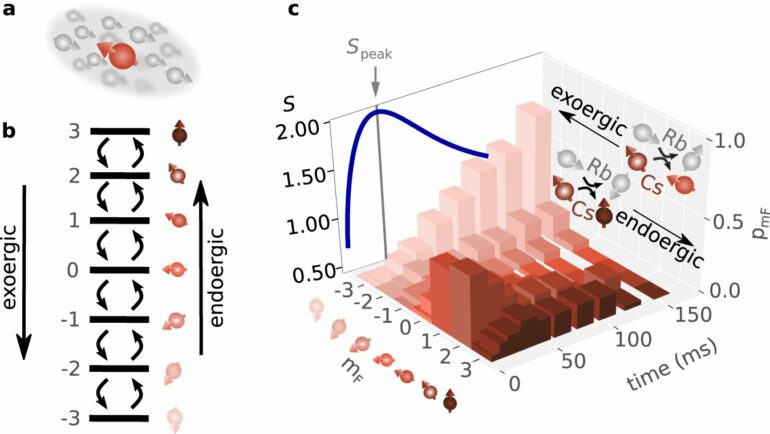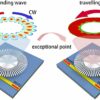by Melanie Löw, Rheinland-Pfälzische Technische Universität Kaiserslautern-Landau
Universal behavior is a central property of phase transitions, which can be seen, for example, in magnets that are no longer magnetic above a certain temperature. A team of researchers from Kaiserslautern, Berlin and Hainan, China, has succeeded for the first time in observing such universal behavior in the temporal development of an open quantum system, a single cesium atom in a bath of rubidium atoms.
This finding helps to understand how quantum systems reach equilibrium. This is of interest to the development of quantum technologies, for example. The study has been published in Nature Communications.
Phase transitions in chemistry and physics are changes in the state of a substance, for example, the change from a liquid to a gaseous phase, when an external parameter such as temperature or pressure is changed.
“Magnets are a good example,” says Professor Dr. Artur Widera, who heads the Individual Quantum Systems unit at University Kaiserslautern-Landau (RPTU).
“Ferromagnets show spontaneous magnetization without an external magnetic field, i.e. they are inherently magnetic, but only below a certain critical temperature. When the temperature rises above this point, the system undergoes a continuous phase transition; above this temperature, the material is no longer magnetic.”
In an experiment, a universal behavior at a phase transition can be specifically induced by changing a parameter such as pressure, magnetism or temperature. The special thing is that this behavior of a physical quantity “can be described by a few critical parameters,” Widera continues, “which in turn are independent of the details of the system under consideration.”
Can this universal behavior also be observed in the quantum world, i.e. at the atomic and subatomic level?
In the current study, Widera’s research team placed individual cesium atoms in a specific quantum state and immersed them in a gas of rubidium atoms. This combination of a single quantum system (cesium) interacting with the rubidium bath is also referred to in specialist circles as an open quantum system. Both the cesium atoms and the rubidium atoms were cooled down to almost absolute zero.
“In contrast to the usual observations, in our experiment, the time was the parameter that should reach a critical point, or critical time,” says Dr. Jens Nettersheim, research associate at Widera and co-author of the study. To achieve this, the researchers had to excite the quantum system with a great deal of energy.
“What we have now observed is that the entropy first increases as the system develops over time,” adds Ling-Na Wu, a theoretical physicist who accompanied the project and is the first author of the study.
Researchers understand the term entropy as a measure of the disorder in a certain system and therefore also the possibility of particles arranging themselves in a system—as in this case the cesium and rubidium atoms. The greater the disorder in a system, the higher the entropy and vice versa. Wu says, “This happens until the entropy reaches its maximum value, which then decreases again.”
It is precisely at this point, the critical time, that the universal behavior of the quantum system sets in. André Eckardt, Professor of Theoretical Physics at the Technische Universität (TU) Berlin, who led the theoretical work on this project, explains, “At this time, the following happens: Figuratively speaking, the system loses its memory of what happened earlier, or of the exact initial state. The subsequent dynamics are universal.” In physics, this means that the behavior can be described with a formula and a parameter.
The study shows that in open quantum systems there is universal behavior with regard to time. With this work, the physicists are contributing to a better understanding of the fundamental functioning of such systems. “It is still not entirely clear how such open quantum systems release energy, i.e. relax, and how exactly thermodynamic equilibrium is achieved,” explains Widera.
Many technical applications today only work thanks to the quantum technology that is built into them. In the future, it will play an increasingly important role, for example in quantum computers or quantum sensors. It is therefore important to understand what happens in such systems and how they interact with their environment.
Widera’s team carried out the experiments at RPTU in Kaiserslautern; the theoretical work for this study was provided by the working group led by Professor Dr. André Eckardt from the Institute for Theoretical Physics at TU Berlin, with Ling-Na Wu from Hainan University in China also involved.
More information:
Ling-Na Wu et al, Indication of critical scaling in time during the relaxation of an open quantum system, Nature Communications (2024). DOI: 10.1038/s41467-024-46054-9
Provided by
Rheinland-Pfälzische Technische Universität Kaiserslautern-Landau
Citation:
Open quantum system shows universal behavior (2024, March 5)



